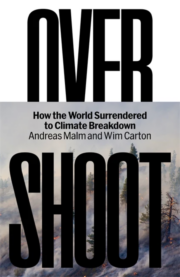
Checkmate: A Review of Overshoot
“I am proud that as Vice President over the last four years, we have invested a trillion dollars in a clean energy economy while we have also increased domestic gas production to historic levels.”
– Kamala Harris
In a matter of decades, the damage done to the ozone layer by manmade chlorofluorocarbons has reversed. Use of the harmful chemicals was halted, and in time the damage has effectively healed. In 1980, the WHO declared smallpox eradicated, while tuberculosis, our species’ deadliest infectious disease, has been curable for nearly a century. Why then, in the 6 years since the IPCC stunned the world with its special report on the effects of 1.5° C of warming, has the world warmed to nearly 1.5° C above preindustrial levels – seemingly with no end in sight?
The only time there has been an actual decrease in global emissions consistent with the non-binding goals of the Paris Agreement was amidst the disruptions of covid-19 in 2020, and in 2021 – and in every year since – fossil fuels have become more profitable. But we have known for years there would be no possibility for limiting – let alone reversing – global warming if more reserves were extracted. Not another pipeline, rig, mine, or field would do. And yet hundreds are being built across the US alone. The damage is already displacing and killing millions in record flooding and heat. Though the worst of it is being felt on the other side of the world, the imperial core has also seen the portents of climate collapse: grids buckling under frost, developed coasts eroding to bigger storms, flooding in cities, smoke choking whole states, heat. Yet investment and extraction haven’t stopped, haven’t even slowed – have reached record highs, in fact.
There is a name for this program that every hegemonic force on the globe operates under: “overshoot.” The architects of this regime, the investors playing numbers games, executives insisting on exponential growth, politicians approving the construction and destruction all have names and addresses – and Andreas Malm (How to Blow Up a Pipeline) and Wim Carton are putting them on trial.
Out October 1 via Verso Books, Overshoot writes a relentless history of climate collapse. Compiling all the dates and names future humans might seek out to understand how their lives were forfeited by past generations, Malm and Carton detail a history of capital, land, and discourse, naming the profiteers and alarmists along the way. It’s a history so contemporary (like “[following] long distance projectiles gliding through the sky”), to read it written in past tense feels like seeing our own coffins.
It may feel like we are checked, but the missiles are still in the air, the destruction of in development fossil capital is still unrealized. It’s checkmate.
Overshoot is a bibliography for the climate movement; a record, not a manifesto. It does not argue the need for action, but studies how inaction has won. Though there is still plenty of Marxist and revolutionary thought discussed, the authors’ Ten Theses on the Overshoot Conjuncture read like concise observations to make sense of the present program ensuring we all reading this here lead lives that will not disrupt warming – like theorems for the current world order. The tenth thesis: “If it is now too late to prevent warming of 1.5° C, it is then too late, above all, and for that very reason, to give up on the struggle against fossil capital.”

More generally, overshoot might describe the status quo of our particular end of the world – it’s the same feeling of watching another mass shooting at a school, of seeing more body cam footage of militarized police extorting whole city budgets to execute civilians. It’s the helicopters flying over my apartment every day now and the US-made missile flying over Palestine, it’s the complete dissolution of public health following Biden’s pandemic response failure, it’s voting for someone who will drop bombs on kids no matter how many steps removed the proxy nor how Arab the target. It’s business as usual.
An overshoot theory of the end would also echo Fisher’s Capitalist Realism, as in the lack of imagination and furthering toward one end as inevitable is present, but going back further to the foundation of his argument where he critiques the depiction of apocalypse in Children of Men: “it is being lived through. There is no punctual moment of disaster; the world doesn’t end with a bang, it winks out, unravels, gradually falls apart.”
And overshoot is apocalyptic in that it is revelatory. The contradictions only grow more visible and more severe, but don’t lead to change, but rather, acceleration via policing and architecture and consumption. More mining, more guns, more cops, more electoralism. And the American proletariat won’t ever resist enough; every flash point has proven that the protests will dwindle until they’re small enough for cops to kettle.
I suppose this essay, or my entire portfolio, is a bibliography of overshoot – from how phosphate mining inevitably destroying my home emotionally displaces me or how I still live my life without stopping it, disaffected, allowing the damage to happen while I write again about videogames. But if we, the people, are in checkmate (and we are), then it is not time to rewrite the rules at the next COP or city budget hearing or election. Best flip the board – flip the whole table. Or, as Mario Savio said in 1964:
“… you’ve got to put your bodies upon the gears and upon the wheels, upon the levers, upon all the apparatus, and you’ve got to make it stop! And you’ve got to indicate to the people who run it, to the people who own it, that unless you’re free, the machine will be prevented from working at all!”
———
Autumn Wright is an essayist. They do criticism on games and other media. Find their latest writing at @TheAutumnWright.





